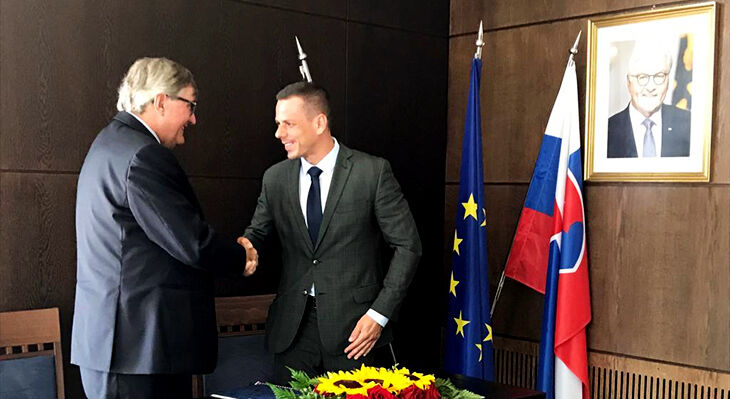Teaming up to master the challenges in VET
A renewed Joint Declaration of Intent was signed in Bratislava on 11 September 2019, continuing the VET cooperation between Germany and Slovakia. Since 2012, the Federal Ministry of Education and Research (BMBF) has been supporting the reform of the education system and its dual training approach.

The Joint Declaration of Intent on cooperation in vocational education and training for the next three years was signed with the Slovakian Ministry of Education in Bratislava in a festive setting at the residence of the German ambassador. In signing this declaration, the Director General of International Cooperation and European Affairs, Marek Moška, and BMBF Head of Directorate, Wilfried Kraus, confirmed the continuation of the consolidated German-Slovakian vocational education and training partnership.
The main focus of the Slovakian economy is on the automotive sector, encompassing production plants, supplier companies and mechanical engineering. More than a million cars were produced in the country’s four original equipment manufacturer plants in 2018. Slovakia thus remains the world leader in terms of automobile production per capita. Over 145,000 jobs are directly dependent on the automotive industry. The largest labour market in Slovakia is provided by jobs in production, followed by wholesale, retail, maintenance work and construction.
Despite a relatively high rate of youth unemployment, there is an acute lack of specialists at the non-academic level. Employment opportunities for graduates from vocational schools have therefore substantially improved since 2015. Although figures show an upward trend in training, they are not yet satisfactory. The option of dual training for students was introduced to the Slovakian education system four years ago. The dual training model was legally defined as a supplement to the existing training model, which had until then been largely school-based. The improvement of the entire vocational education and training system is also evident in the fact that bodies now exist at all levels to take decisions on updating, aligning and organising vocational education and training. Companies can assume responsibility for up to 50% of training and receive, among other things, tax benefits from the state in line with their engagement. Company training staff are trained to qualify them as “instructors” so that they can perform their educational tasks. However, the option of undergoing dual training – with or without a university entrance qualification – has not yet been communicated throughout the country. Although both the students and the companies receive broad governmental support, the model is not yet universally known on both sides. Incentives include scholarships for high educational achievements, a salary for the productive learning phases of the training, and direct financial assistance for small and medium-sized companies providing practical training. The financial support per trainee per school year amounts to 1,000 euros for small and medium-sized companies, 700 euros for larger companies offering at least 400 hours of practical experience and 300 euros for 200-400 hours of in-company training.
View a view to increasing the appeal of vocational education and training in Slovakia, an emphasis is now being placed on the themes of German-Slovakian cooperation. In addition to improving vocational orientation, these include higher vocational education and training, the expansion of career advancement qualifications with the master title and the digitalisation of the world of work. There are also plans to enhance the learning venue cooperation between schools and companies in order to further disseminate the dual approach. On behalf of the BMB, GOVET will provide specialist support for projects emerging from the items in the Joint Declaration of Intent and also support their implementation.